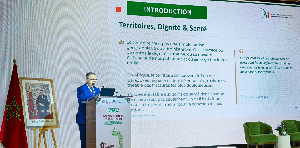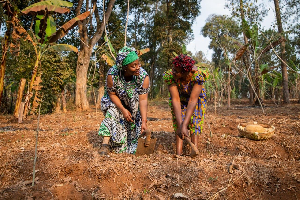Ghana has received approval from the African Development Bank (AfDB) for a project to restore degraded forest reserves and double a sustainable forest plantation through a first-of-its-kind Public-Private Partnership (PPP) in its forest sector.
The project is backed by a US $10-million concessional loan from the Climate Investment Funds’ Forest Investment Program (CIF FIP) approved on July 1, and supplemented by US $14 million in co-financing from the AfDB.
The project approval comes a day after Ghana ratified the Paris Agreement on climate change at the UN in New York, signaling its full commitment to linking its climate action and development path. Ghana’s restoration of its forest sector will play an important role in meeting its commitments under the Agreement.
Ghana’s forests, which once covered a third of its 24-million-hectare landmass, have been degraded at an alarming rate by excessive and often illegal logging, slash-and-burn agriculture, mining and quarrying, and fuelwood collection.
The newly approved project aims to help reverse this trend by restoring and expanding an existing Forest Stewardship Council (FSC) certified 5,000 ha forest plantation to nearly 12,000 ha of sustainable commercial forest plantation made up of 10% indigenous tree species and 90% teak.
Importantly, the program will conform to both FSC and Verified Carbon Standard (VCS) certification standards. Developed under the CIF’s competitive set-aside program to engage the private sector, the project is a partnership with Form Ghana, a private Ghanaian company with the motto “Forests for the Future”, which applies sustainable plantation management to attract new investors in the forest plantation subsector.
“This is an exciting and significant investment in a key sector for Africa and one which provides multiple benefits to the continent,” stated Gareth Phillips, AfDB’s CIF FIP coordinator. “The FSC certification has been key in getting this project approved, as it provides investors with the confidence that the project is sustainable and at the same time brings authentic long-term benefits to the communities and environment.”
The project is designed to have a significant transformational impact on the Ghana forest plantation sector by supporting a new business model that will serve as an example to other investors, producing wood products which have the quality and sustainability stamp that will help meet increasing market demand while avoiding pressure on natural reserve forests.
In line with CIF and AfDB standards, the project has been structured through extensive engagement with all stakeholders throughout the country. Expected outcomes from the project include: net greenhouse gas sequestration potential of around 2.8 million tonnes CO2 over 40 years (a long-term average of 70,103 tCO2 per year); 11,700 ha of sustainably managed forest plantation with FSC and VCS certification; and 400 direct full-time jobs and 600 direct seasonal jobs. The project includes a goal of ensuring that, in this heavily male-dominated industry, 40% of the jobs generated through the project will be held by women.
“AfDB has chosen to support this project because its goals are consistent with our institution’s reaffirmed commitment to help African countries like Ghana meet their climate change and sustainable development goals,” added Richard Fusi, Task Team Leader. “We hope that this project becomes a replicable model for attracting private sector finance to this particular sector and that Ghana, through this project, will help lead the way for further investment in sustainable forest management in African countries.”
The project will help meet Ghana’s overarching FIP goals by addressing the underlying drivers of deforestation and catalyzing transformational change through up-front investment to support the country’s strategy on Reducing Emissions from Deforestation and Forest Degradation, sustainable management of forests, and enhancing forest carbon stocks
Business News of Wednesday, 28 September 2016
Source: B&FT













